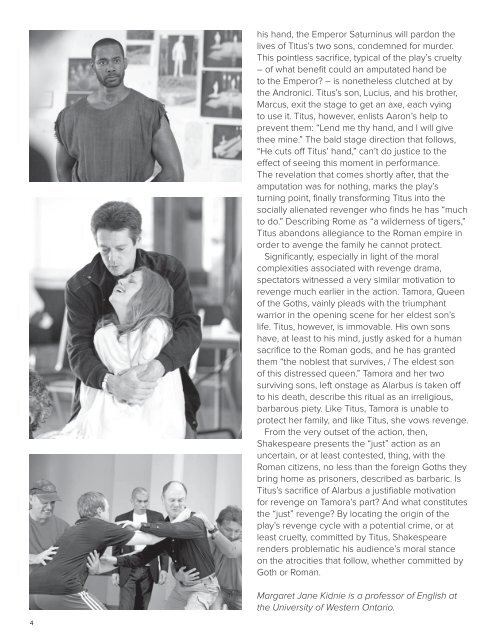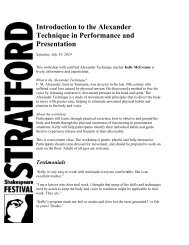TiTus andronicus - Stratford Festival
TiTus andronicus - Stratford Festival
TiTus andronicus - Stratford Festival
You also want an ePaper? Increase the reach of your titles
YUMPU automatically turns print PDFs into web optimized ePapers that Google loves.
his hand, the Emperor Saturninus will pardon the<br />
lives of Titus’s two sons, condemned for murder.<br />
This pointless sacrifice, typical of the play’s cruelty<br />
– of what benefit could an amputated hand be<br />
to the Emperor? – is nonetheless clutched at by<br />
the Andronici. Titus’s son, Lucius, and his brother,<br />
Marcus, exit the stage to get an axe, each vying<br />
to use it. Titus, however, enlists Aaron’s help to<br />
prevent them: “Lend me thy hand, and I will give<br />
thee mine.” The bald stage direction that follows,<br />
“He cuts off Titus’ hand,” can’t do justice to the<br />
effect of seeing this moment in performance.<br />
The revelation that comes shortly after, that the<br />
amputation was for nothing, marks the play’s<br />
turning point, finally transforming Titus into the<br />
socially alienated revenger who finds he has “much<br />
to do.” Describing Rome as “a wilderness of tigers,”<br />
Titus abandons allegiance to the Roman empire in<br />
order to avenge the family he cannot protect.<br />
Significantly, especially in light of the moral<br />
complexities associated with revenge drama,<br />
spectators witnessed a very similar motivation to<br />
revenge much earlier in the action. Tamora, Queen<br />
of the Goths, vainly pleads with the triumphant<br />
warrior in the opening scene for her eldest son’s<br />
life. Titus, however, is immovable. His own sons<br />
have, at least to his mind, justly asked for a human<br />
sacrifice to the Roman gods, and he has granted<br />
them “the noblest that survives, / The eldest son<br />
of this distressed queen.” Tamora and her two<br />
surviving sons, left onstage as Alarbus is taken off<br />
to his death, describe this ritual as an irreligious,<br />
barbarous piety. Like Titus, Tamora is unable to<br />
protect her family, and like Titus, she vows revenge.<br />
From the very outset of the action, then,<br />
Shakespeare presents the “just” action as an<br />
uncertain, or at least contested, thing, with the<br />
Roman citizens, no less than the foreign Goths they<br />
bring home as prisoners, described as barbaric. Is<br />
Titus’s sacrifice of Alarbus a justifiable motivation<br />
for revenge on Tamora’s part? And what constitutes<br />
the “just” revenge? By locating the origin of the<br />
play’s revenge cycle with a potential crime, or at<br />
least cruelty, committed by Titus, Shakespeare<br />
renders problematic his audience’s moral stance<br />
on the atrocities that follow, whether committed by<br />
Goth or Roman.<br />
Margaret Jane Kidnie is a professor of English at<br />
the University of Western Ontario.<br />
4

















